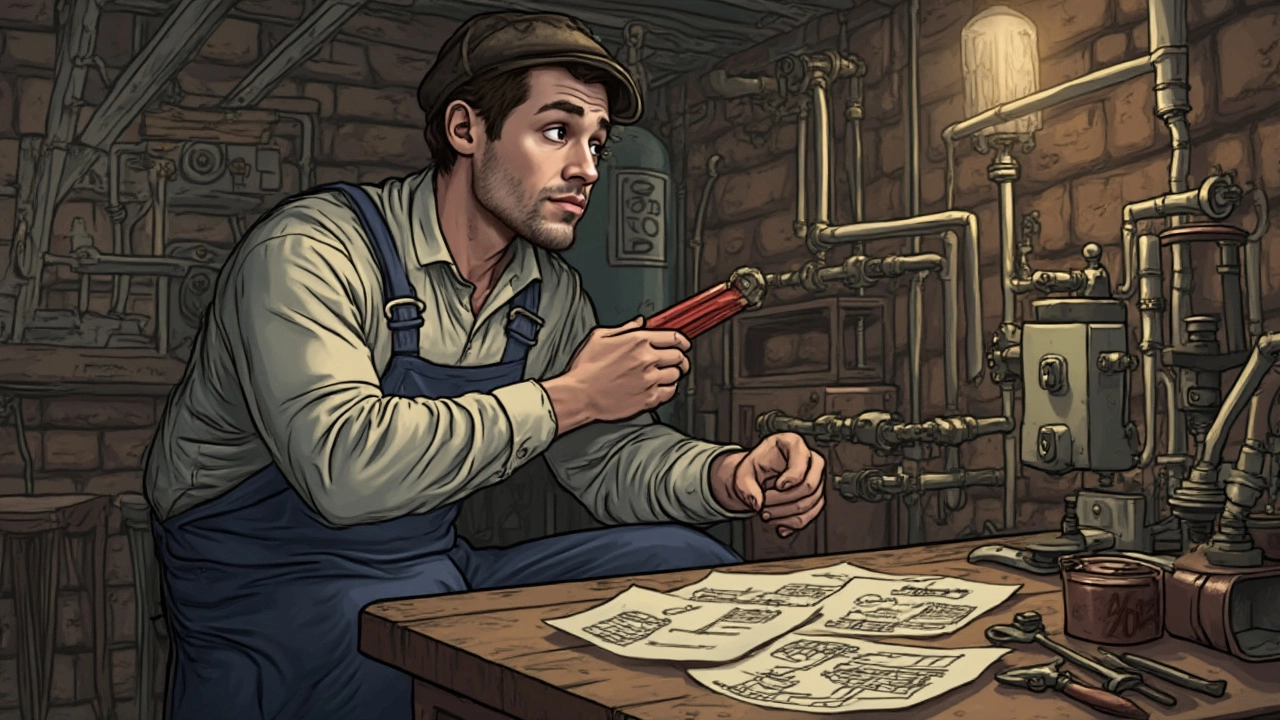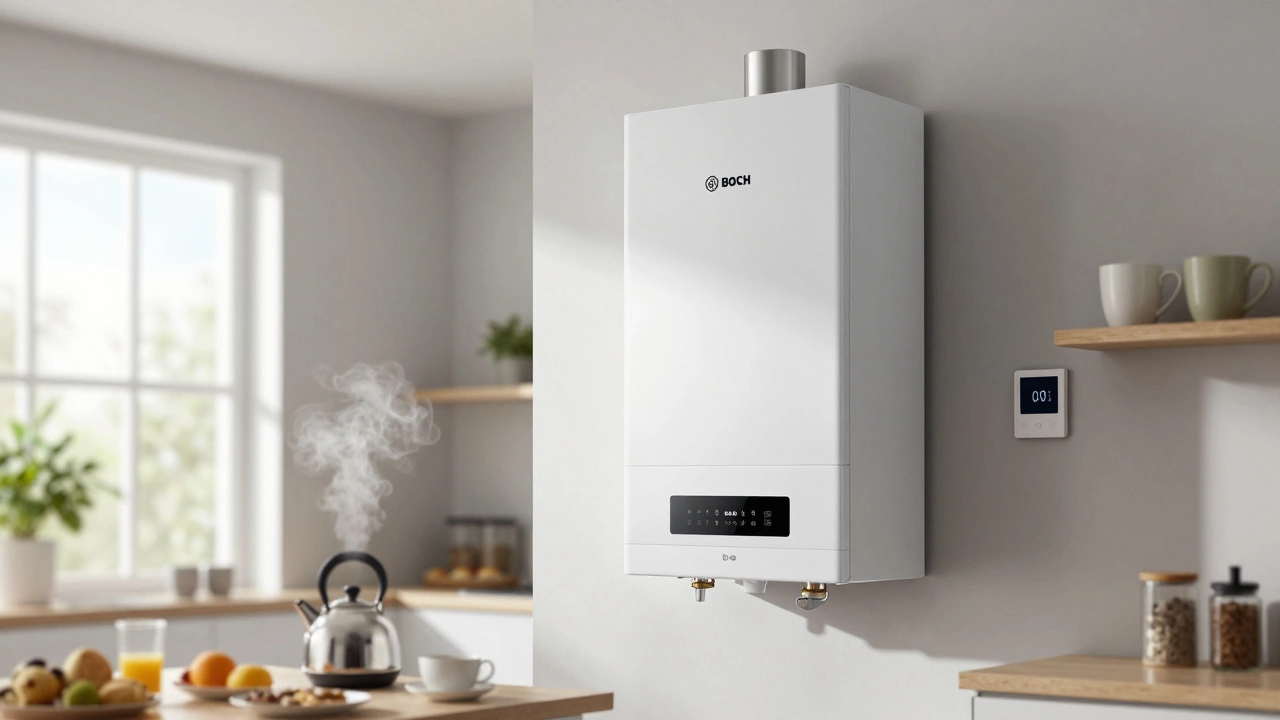
- 9 Apr 2025
- Gideon Thornton
- 0
So, you've got a boiler that's been chugging along for 15 years. You might be wondering if it’s time to say goodbye or just let it be. Boilers aren’t the most exciting household items, but they’re crucial. Knowing when to replace one can save you a heap of trouble and maybe some cash.
First things first, boilers have come a long way in terms of efficiency. Old boilers, like that 15-year-old buddy of yours, are generally less efficient than their modern counterparts. They may start costing you more on your energy bills. Think of it like a car that guzzles petrol—you're paying more for less mileage.
But it’s not just about money. Safety counts too. Older boilers have a higher risk of leaks or even carbon monoxide emissions. So, if peace of mind's what you're after, a newer model might just do the trick.
- Why Age Matters in Boilers
- The Efficiency Gap
- Spotting Signs of Wear and Tear
- Cost Analysis: Repair vs. Replace
- Environmental Considerations
- Making the Decision
Why Age Matters in Boilers
When it comes to boilers, age isn’t just a number. It’s a big deal because boilers, like beloved old cars, don’t last forever without showing some wear. A 15-year-old boiler could be way past its prime, depending on how well it’s been kept and its original quality.
The average lifespan of a boiler is usually around 10 to 15 years. So, if your boiler's been around for a decade and a half, it's possibly living on borrowed time. As boilers age, they lose efficiency, meaning they cost more to run and offer less heat. This decrease in efficiency means you’re likely pouring extra pounds into energy bills you might not even be aware of.
One of the big concerns is the risk factor. Parts get worn out, the chance of a breakdown increases, and there’s a higher likelihood of problems like leaks or even the dreaded carbon monoxide leaks. It's like driving with an engine light on and hoping it'll fix itself—probably not the best idea.
Let's not forget about technological advances. Boilers from 15 years ago didn’t have all the modern features that help conserve energy and reduce environmental impact. So, unless your boiler was cutting-edge back in the day, chances are it’s not up to scratch compared to new models.
| Boiler Age | Expected Efficiency | Potential Issues |
|---|---|---|
| 0-5 years | 90-95% | Minimal |
| 5-10 years | 80-85% | Minor wear |
| 10-15 years | 70-75% | Part failures, inefficiency |
| 15+ years | Below 70% | Frequent breakdowns, safety risks |
So, while a boiler replacement might seem like a big upfront investment, considering the potential savings on energy bills and avoiding unexpected repair costs, it might just be the smart move to make. Plus, you get that sweet bonus of improved safety and eco-friendliness.
The Efficiency Gap
Alright, let's get real about efficiency—specifically the kind of efficiency that affects your wallet and the planet. Boilers tend to tick along for years, but as they age, their efficiency generally drops. It’s like they’re getting tired and just can’t keep up with the younger models.
Now, newer boilers are like the rock stars of efficiency, often boasting an efficiency rate of over 90%. In contrast, your 15-year-old system is probably sitting somewhere around 70%. What does this mean? Well, boiler efficiency is about how well your unit converts energy into heat. The newer the boiler, the more of your money actually goes toward heating your home, rather than being wasted.
You might be thinking, "How does that translate in the real world?" Here's a practical example: if your monthly heating bill is around £100, an upgrade could potentially save you £20 to £30 per month. Over a year, these savings can be significant, helping to offset the cost of purchasing a new boiler.
Another thing to consider is that newer models are often designed to be more environmentally friendly, reducing your carbon footprint. Many modern boilers are compatible with smart thermostats and have features that allow for precise control, further enhancing energy efficiency.
To sum up, swapping to a new boiler isn't just about saving a couple of quid each month. It’s a chance to boost your home’s efficiency, cut down on energy waste, and do a bit for the planet while you're at it.
Spotting Signs of Wear and Tear
Figuring out whether your trusty old boiler needs replacing can be tricky. But if you know what to look for, it's a whole lot easier. Boilers have their ways of telling you they're struggling.
First up, keep an ear out for strange noises. Is your boiler making banging, clunking, or whistling sounds? These might be trying to grab your attention. They often mean parts inside are wearing out or maybe there's trapped air. Definitely not something to ignore!
Then, there's the age-old issue of leaking. Water pooling around your boiler could point to corroded parts or other issues that might only get worse if you leave them be. Moisture and electronics aren't the best of pals, after all.
Efficiency hits are another sign. If your energy bills are creeping up despite normal usage, your boiler could be slacking off. Older boilers can end up working double-time to heat your home, burning a hole in your pocket while they’re at it.
Also, watch out for delays in heating or irregular hot water flow. If your showers are suddenly going ice-cold midway, your boiler might be waving a red flag.
- Frequent breakdowns mean an increasing likelihood of something big giving out.
- Also, if you find yourself constantly calling the repair guy, consider if replacing might save you more in the long run.
- Yellow pilot lights (instead of blue) can indicate that the boiler isn’t burning fuel efficiently, which might be dangerous.
Checking on these signs can help you catch issues before they balloon into costly repairs or riskier situations. It’s always better to be proactive.

Cost Analysis: Repair vs. Replace
Deciding whether to repair or replace your old boiler might feel like choosing between fixing an old car or getting a new one. It's about weighing the current costs against future savings. So, let’s break it down.
First up, the big question is: how often does your boiler need those annoying repairs? If you're calling someone in to fix it more often than you'd like, it might actually be cheaper in the long run to invest in a new one. Repairs add up, and sometimes they just delay the inevitable.
Now, consider this: the cost of a new boiler replacement can vary quite a bit. In the UK, a mid-range boiler unit can set you back anywhere from £1,500 to £3,000 including installation. It sounds steep, but think about how it might lower your energy bills because newer boilers tend to be more efficient.
If we look at repairs, a typical repair job can range from £100 to £500 depending on what’s broken. And remember, older boilers might not even have parts available anymore, which could mean higher costs or the need for creative solutions.
Here's a quick tip to help decide: if the boiler repair cost is more than half the cost of a new boiler, it might be time to hit the reset button and get a brand new one.
If you love numbers, here’s a little insight: suppose your old boiler is running at 70% efficiency, and a new one runs at 90%. That 20% efficiency gain could mean significant savings on your energy bill over time. Check this data to catch the difference:
| Boiler Efficiency | Annual Energy Cost |
|---|---|
| Old Boiler (70%) | £850 |
| New Boiler (90%) | £660 |
So, if you’re seeing less 'bang for your buck' with your current setup, it might be time to consider replacing. It boils down to how much you're willing to pay now to save later. Literally, sometimes, buying new isn’t about spending more, but actually spending smarter.
Environmental Considerations
Replacing your old boiler isn't just about slashing bills; it's a chance to do a bit of good for the planet too. New boilers are much more environmentally friendly compared to the old models. They burn fuel more efficiently, which means they waste less energy and pollute less.
Old boilers often work at below 70% efficiency, which basically means you're not only wasting heat but churning out more carbon emissions. On the other hand, modern boilers can reach efficiencies of over 90%. That's like taking a huge chunk out of your carbon footprint. How cool is that?
If you're keen on boiler replacement, you're also reducing your home's overall environmental impact. New boilers usually come with what's called a 'modulating technology'. This means they only work as hard as they need to, making them more compatible with renewable energy sources like solar panels. So, if you're dreaming of a greener home, a new boiler is a step in the right direction.
Here's a neat detail: according to the UK government, replacing your old gas boiler with a modern eco-friendly model could cut down your home’s CO2 emissions by around 875 kg each year. That's like planting over 30 trees!
Plus, some places offer incentives for upgrading to more energy-efficient appliances, so it's worth checking if you can get cash back or any government grants when you make the swap. Saving the planet and your pockets simultaneously doesn't sound too bad, right?
Making the Decision
Deciding whether to replace your 15-year-old boiler isn’t something to take lightly. Let’s break it down into what really matters so you can make the best choice.
Start by thinking about your energy bills. If they've been creeping up, your old boiler might be to blame. New boiler models are much more efficient – they can save up to 30% on energy costs, which adds up over time. If you’re all about saving money and energy, going new is a pretty solid bet.
Then consider safety. An old boiler is like having a car that could break down any moment. You don’t want to risk leaks or carbon monoxide issues. Installing a new one brings peace of mind, knowing that everything’s in top-notch condition.
"A well-maintained high-efficiency boiler can cut energy costs significantly and offer long-term reliability," says Sarah Beeny, renowned property expert.
Repair costs are another thing. If you're constantly fiddling with your boiler or calling a repairman, those bills add up. When repairs start costing almost as much as a new boiler, it’s definitely time to think about replacing it.
- Check your boiler's performance: If it's losing efficiency, it might be time to part ways.
- Weigh the cost: If repairs are constant, replacing could be cheaper in the long run.
- Consider your home’s needs: Bigger homes might benefit more from the improved capacity of a new boiler.
For some, sticking with an old boiler might seem like an economical choice. But when you factor in the potential for breakdowns and lack of efficiency, investing in a new one starts looking a lot smarter. It’s not always about what you spend upfront but what you save over the years.
In the end, if you’re planning on selling your home anytime soon, a new boiler could enhance its value. Buyers appreciate upgrades that save them future headaches.



